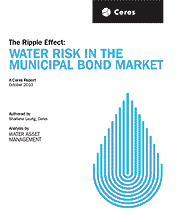Ceres Principles - Corporate Environmental Conduct
Publication Type:
Web ArticleSource:
Ceres | Investors and Environmentalists (2010)URL:
http://www.ceres.org/Page.aspx?pid=416Keywords:
companiesNotes:
According their website, Ceres (pronounced “series”) is a national network of investors, environmental organizations and other public interest groups working with companies and investors to address sustainability challenges such as global climate change.
Ceres also directs the Investor Network on Climate Risk, a network of 90 investors with collective assets totaling about $10 trillion.
See: Ceres. August 5, 2010. "Investors Managing $2.5 Trillion Press Energy Companies to Better Disclose Spill Prevention and Response Plans for Deepwater Wells Worldwide".
"It is important for all companies involved in subsea deepwater drilling to be open and transparent with investors and stakeholders at this crucial historic moment," wrote the investors.
A report published on 3BL Media, Dec. 14, 2010, stated that the request was made in a letter last week from the Investor Network on Climate Risk (INCR), a network of 98 investors with collective assets totaling over $9 trillion. It was sent to the National Commission on the BP Deepwater Horizon Oil Spill and Offshore Drilling, whose final report and recommendations are expected in January. It was signed by Mindy S. Lubber President, Ceres Director, Investor Network on Climate Risk.
See: The Investor Environmental Health Network. 2010. Overview: Hydraulic Fracturing for Natural Gas Development.
See: Before the Big Spill | Mixplex
See: National Commission on the BP Deepwater Horizon Oil Spill and Offshore Drilling | Mixplex
See: Sharlene Leurig, Water Asset Management, Ceres Report. October 2010. "The Ripple Effect: Water Risk in the Municipal Bond Market". Investor Network on Climate Risk. (PDF Download 6.6MB).
This report shows that few participants in the bond market—including investors, bond rating agencies and the utilities themselves—are accounting for growing water scarcity, legal conflicts and other threats in their analyses.
See: Futurism Now
See: H2Oil: An Explanation of the Tar Sands in Alberta
See: Keystone XL Pipeline - Issues
See: As You Sow - Corporate Accountability, Shareholder Action, and ToxicsReduction







